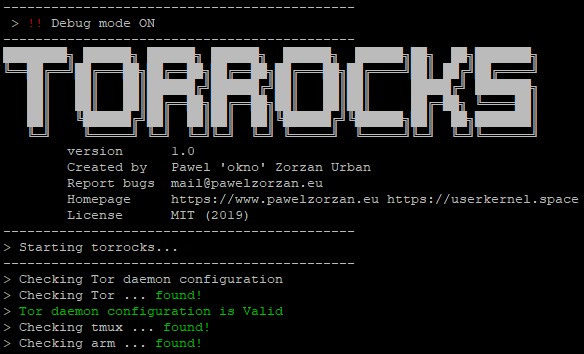Run your own TOR exit node & control it with Tor Control Center (TCC)
Templates for a secure Tor exit node configuration
The purposals of torrocks is to give an overview on Tor, Hidden Services, and monitoring with a series of best practices, reviewd documentation, scripts and tips.
- Install script (bash)
- Upload torrocks project
- Manage script (bash)
- Securty script (bash)
- Write base README.md
- Write Complete documentation
- Add The Onion Box Web interface integration
- Bugfix
Tor is free and open-source software for enabling anonymous communication. The name is derived from an acronym for the original software project name "The Onion Router". Tor directs Internet traffic through a free, worldwide, volunteer overlay network consisting of more than seven thousand relays to conceal a user's location and usage from anyone conducting network surveillance or traffic analysis. Using Tor makes it more difficult to trace Internet activity to the user: this includes "visits to Web sites, online posts, instant messages, and other communication forms". Tor's intended use is to protect the personal privacy of its users, as well as their freedom and ability to conduct confidential communication by keeping their Internet activities from being monitored. (Wikipedia)
Remove old installation and configurations files that could create problems during the setup of torrocks.(Not mandatory)
# sudo service tor stop
# sudo killall -9 tor
# sudo apt remove -y --purge tor tor-arm tor-geoipdb python-geoip python-torctl torsocks
# sudo apt autoremove
# sudo rm -rf /var/log/tor
# sudo rm -rf /etc/tor
# sudo rm -rf /var/lib/tor #(Backup your old private key before removing /var/lib/tor/hidden_service
# cd /opt
# sudo git clone https://github.com/okno/torrocks
# sudo chmod +x /opt/torrocks/torrocks.sh
# sudo ln -s /opt/torrocks/torrocks.sh /usr/bin/torrocks
Check if torrocks symbolic link is correctly placed :
ls -al /usr/bin/torrocks
Output :
lrwxrwxrwx 1 root root 25 Jun 23 23:21 /usr/bin/torrocks -> /opt/torrocks/torrocks.sh
You can find Tor inside the most OS,be sure to install the latest version, on Linux Debian 9.9 stretch just type :
# sudo apt update
# sudo apt install tor -y
# sudo service tor start
If everything is ok Tor daemon should be up and running with default configuration, listening on 127.0.0.1 on port 9050, to check your Tor deamon you can use :
# sudo netstat -putan | grep tor
You should see an output like this :
tcp 0 0 127.0.0.1:9050 0.0.0.0:* LISTEN 13302/tor
Now check if the tor process is running by the user debian-tor :
# sudo ps -u debian-tor
Output :
PID TTY TIME CMD
13302 ? 00:00:01 tor
You can also check the status of the deamon whit the service command of systemd(shit)
# sudo service tor status
Output :
● tor.service - Anonymizing overlay network for TCP (multi-instance-master)
Loaded: loaded (/lib/systemd/system/tor.service; enabled; vendor preset: enabled)
Active: active (exited) since Sun 2019-06-23 15:39:58 BST; 22min ago
Process: 13295 ExecStart=/bin/true (code=exited, status=0/SUCCESS)
Main PID: 13295 (code=exited, status=0/SUCCESS)
Tasks: 0 (limit: 4915)
CGroup: /system.slice/tor.service
Jun 23 15:39:58 HOSTNAME systemd[1]: Starting Anonymizing overlay network for TCP (multi-instance-master)...
Jun 23 15:39:58 HOSTNAME systemd[1]: Started Anonymizing overlay network for TCP (multi-instance-master).
Ok, now we are sure that the tor daemon is running with PID 13302, with user debian-tor, listening on 127.0.0.1 on port 9050
Configure HTTP&SSH Hidden Services + Enable TOR Exit node
This is the most important section to understand, here you can find a detailed configuration of two hidden services and enbling a TOR Exit node.
Now check
# XXXXXXX
#################################################################### TO BE CONTINUED ####################################################################
| File | Description |
|---|---|
| /var/log/tor/ | Default log Tor directory |
| /usr/share/doc/tor | Sample config&template files for tor and hidden services |
| /var/log/tor/notices.log | Tor health log (best for Tor service analysis) |
| /var/log/tor/debug.log | Tor debug log (best for debugging & network analysis) |
| /etc/tor | Tor configurations files |
| /etc/tor/torrc | Tor daemon configuration file |
| File | Description |
|---|---|
| torrc | Main configuration file |
| tor-exit-notice.html | Html template for Tor data port |
| tor.conf | Nginx template for hidden service |
| notices.log | Sample log file |
TCC is a simple method to monitor the health state of yout Tor Exit Node, just open tmux, split in 4 terms, run tailf, netstat, arm and have fun with a beer.
- tor
- tmux
- arm
- netstat
Install arm for Tor
# sudo apt update
# sudo apt install tor-arm
Install tmux
# sudo apt install tmux
This is how my Tor Control Center looks like :

You can contribute in following ways:
- Report bugs
- Give suggestions to make it better
- Fix issues & submit a pull request
Do you want to have a conversation in private? Hit me up on my twitter, or write in XMPP+OTR to okno[at]jabber.ccc.de





